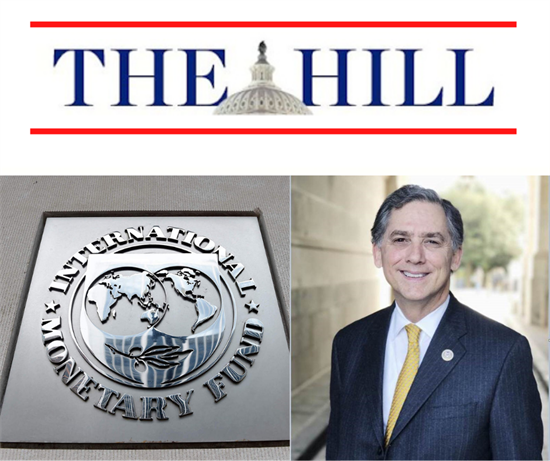ICYMI: Rep. Hill Op-Ed in The Hill: The use and abuse of the IMF in the fight against COVID-19
Washington,
September 15, 2020
WASHINGTON D.C — Today, Rep. French Hill spoke out in The Hill, highlighting in an op-ed the negative impacts of allowing a new allocation of Special Drawing Rights (SDRs) under the International Monetary Fund (IMF). In this op-ed, Hill, the Lead Republican on the Subcommittee on National Security, Monetary Policy and International Institutions of the House Financial Services Committee, points out that some countries, like China, have been lobbying for these SDRs which could be used to obtain hard currency without conditions and do not require repayment.
Rep. Hill argued that this allocation would send over $170 billion to the Chinese government as it sits on more than $3 trillion in foreign reserves, operates internment camps in Xinjiang, and continues violating its international commitments in Hong Kong. Congressman Hill also asserted that the main threat to developing countries today is not a lack of SDRs, but rather the opaque, predatory financing they’ve been saddled with by the Chinese government in complete disregard of multilateral standards. The full op-ed is copied below. The use and abuse of the IMF in the fight against COVID-19 The Hill By: Congressman French Hill Lost in the debate over countries’ responses to COVID-19 is a behind-the-scenes tussle at the International Monetary Fund (IMF) over how to deploy more support to the developing world. Though the IMF possesses around $1 trillion in firepower — thanks in part to action taken by Congress under the CARES Act — some IMF members, particularly China, have been lobbying for billions in extra relief through a new allocation of Special Drawing Rights (SDRs). SDRs created by the IMF could be used by countries to obtain hard currency without conditions, and unlike a typical IMF loan, they would not require repayment. This idea has now gained traction among certain congressional Democrats, who have proposed allocating no fewer than two trillion SDRs — equivalent to around $2.8 trillion — to the IMF’s 189 member countries, even if a country’s needs are in fact minimal. The flaws in this plan, which would require the United States’ approval, are profound. Such an allocation would send over $170 billion to the Chinese government as it sits on more than $3 trillion in foreign reserves, operates internment camps in Xinjiang, and continues violating its international commitments in Hong Kong. The Democrats’ proposal would also send more than $20 billion to Iran, classified by the State Department as the world’s foremost state sponsor of terrorism, as well as $75 billion to the Kremlin, $17 billion to the Assad regime in Syria, and another $20 billion to Venezuela. These billions would represent no-strings-attached liquidity for some of the world’s most brutal dictatorships. Having the IMF lavish SDRs on these regimes is perverse in itself, but it also violates the IMF’s core principles. Under the IMF’s Articles of Agreement, SDR allocations are only intended to meet “the long-term global need,” not the short-term, country-specific emergencies brought on by the pandemic. One only needs to look at the IMF’s own economic forecasts to see that the damage wrought by COVID-19 is highly variable, and may prove less severe in developing countries than proponents of an SDR allocation care to admit. And even in the hardest hit regions, the IMF expects a return to growth next year. If there’s a rationale for more SDRs, “the long-term global need” would not seem to qualify. Insisting on adherence to the IMF’s rulebook may seem frivolous, but in fact it is vital. The main threat to developing countries today is not a lack of SDRs, but rather the opaque, predatory financing they’ve been saddled with by the Chinese government in complete disregard of multilateral standards. The IMF has done important work in pushing for greater transparency and the suspension of debt repayments to Beijing, but the IMF’s case rests on the notion that China should adapt to a rules-based financial order, not the other way around. Disregarding the Articles of Agreement through an SDR allocation would signal to China that such rules are applied selectively; at the very least, the allocation would divert our attention from tackling the source of developing countries’ long-term vulnerabilities. That source resides in Zhongnanhai, not the IMF’s Washington boardroom. |



